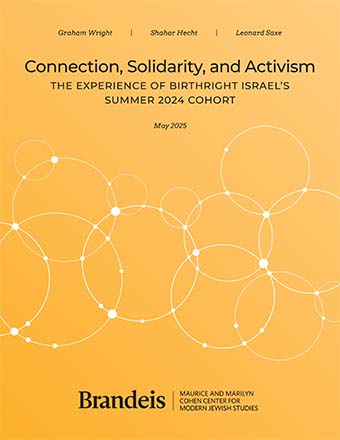Connection, Solidarity, and Activism: The Experience of Birthright Israel's Summer 2024 Cohort
Graham Wright, Shahar Hecht, and Leonard Saxe
May 2025

In summer 2024, Birthright sent over 4,500 young American Jews to Israel on 10-day, peer-educational trips, just as it had been doing since 2000. Unlike at any other period, these young Jews chose to go to Israel while multiple military conflicts were ongoing, and when a spike in antisemitic hostility related to criticism of Israel was occurring at many of the college campuses they attended. The unprecedented context of summer 2024 trips raises important new questions about the Birthright program and US Jewish young adults in general. This report explores the kinds of young Jews who chose to apply to Birthright during this challenging summer and participants' beliefs when they arrived in Israel. The report also examines whether the quality of the experience was disrupted by the war, the extent to which the Birthright trip influenced participants' relationship to Israel, and the trip's effect on their responses to hostile discourse surrounding Israel after returning to the United States.
Key findings:
- Applicants to 2024 Birthright trips were much more connected to Israel, and much more
likely to identify with the political right, compared to applicants in previous years. - Despite the disruptions of the war, 2024 Birthright Israel trips were well
received, and participants found their experiences meaningful. - Despite the fact that summer 2024 participants were highly connected to Israel before the trip, the Birthright experience further increased their level of connection.
- Most participants (and nonparticipants) encountered at least one of the following statements about Israel, mostly in public contexts (like social media): Israel is committing genocide against the Palestinian people, Israel is an apartheid state, Israel is a settler-colonial state.
- Going on a Birthright trip did not change how participants reacted to these statements when they encountered them directly, with the exception of the statement about "genocide." When this statement was encountered in person or on social media, participants were less likely to agree and more likely to present a counter argument.